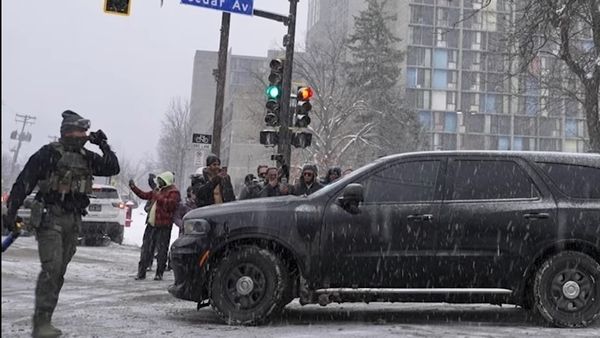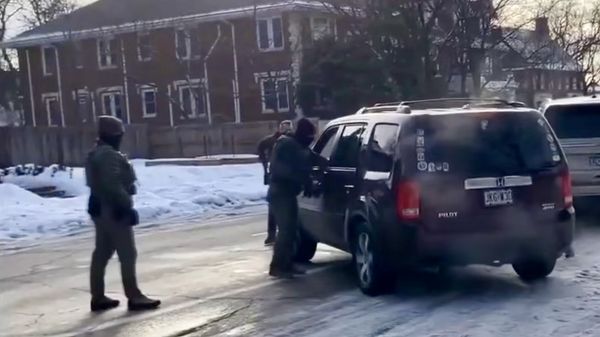
Australia needs a specialist investigations unit to probe allegations of international crimes such as genocide, or it risks becoming a “safe haven” for individuals alleged to have been involved, legal experts and former prosecutors have said.
Reports from the Guardian and Four Corners on Monday that the Rwandan government has issued indictments for two men in Australia it accuses of participating in the genocide against the Tutsi in 1994 have re-animated debate about Australia’s commitment to investigating and prosecuting international crimes such as genocide.
One of the men, who lives in Brisbane, has said allegations against him are “false” and “smears”; the family of the second man says he is innocent although they insist he is not in the country.
The Guardian/Four Corners investigation does not suggest the two men are guilty, only that serious allegations deserve further investigation by an appropriate authority.
Rwanda has requested the men’s arrest and extradition to Rwanda to face fresh trials, or for Australia to prosecute the men domestically.
Rawan Arraf, executive director of the Australian Centre for International Justice, speaking generally, said the lack of a dedicated investigative body in Australia for international crimes risks making Australia “a safe haven” for alleged perpetrators “of the worst crimes against humanity, and the AFP has been left without appropriate resources or skills, or indeed, encouragement from the Australian government, to prioritise the investigation” of such alleged crimes.
“This is a failure of Australia’s international obligations.”
Australia was laggard in making genocide a crime under domestic law, failing to adopt legislation until 2002, and the laws passed were not retrospective, so a charge of genocide pre-dating that time could not be prosecuted under the Criminal Code without legislative change.
Australia does not have an extradition treaty with Rwanda and has never extradited anybody there.
While there are multilateral treaties under which Australia could extradite a person to Rwanda, Australia’s courts, or the government, might be reluctant to return someone to a country with a questionable human rights record and, some observers argue, a compromised criminal justice system.
According to Human Rights Watch, the Rwandan government manipulates elections by arresting or assassinating critics and obstructing opposition parties, and polls are marred by allegations of voter intimidation and electoral fraud.
Some of Rwanda’s community members in Australia have said that the indictment against the two men here is politically motivated, or, at least, has been raised by the Rwandan government as a way to silence dissent.
The Australian Centre for International Justice argues Australia has a “chequered and inconsistent history of international crimes investigation”.
The Australian federal police’s counter-terrorism and special investigations command has responsibility for the investigation of alleged international crimes such as war crimes and genocide. But the ACIJ argues that the “lack of specialisation and expertise” for alleged atrocity crimes “within these generalist teams raises crucial concerns about the efficacy of investigations”.
“Where a generalist unit within the AFP has been involved in international crimes investigations, it has proven ill-equipped to deal with the complexities of these investigations and lacks the expertise required.”
Bob Reid was a senior member of Australia’s now defunct Special Investigations Unit, established in 1987 to search for former Nazi war criminals alleged to have emigrated to Australia. He also spent nearly two decades at the International Criminal Tribunal for the former Yugoslavia.
Reid said Australia was an outlier in not having a specialised, permanent unit dedicated to investigating alleged international crimes, such as war crimes, crimes against humanity and genocide.
“If you look at countries like Germany, France, Sweden, Norway, UK, Spain, even the US, they all have dedicated teams. I mean, the European countries, they leave us for dead.”
He said Australia risked becoming a “haven” for alleged international criminals.
“To just close your eyes and say, ‘Oh well, Australia is a long way away, they won’t come to Australia’ is just very naive.”
A spokesperson for the AFP rejected suggestions it lacked expertise and resources to adequately investigate alleged international crimes.
“Members of the AFP’s CTSI command are highly experienced investigators, many of whom have undertaken specialised training, including through the Institute of International Criminal Investigations in The Hague,” an AFP spokesperson said.
“The AFP works closely with foreign law enforcement agencies, international bodies and mechanisms” who prosecute alleged international crimes to ensure alleged perpetrators “with a connection to Australia are held to account.”
The AFP confirmed Australia has jurisdiction, under the criminal code, to investigate alleged war crimes, crimes against humanity and genocides that occur offshore after 26 September 2002. For alleged offences pre-dating that, the Geneva Conventions Act, a 1957 law, may apply.







